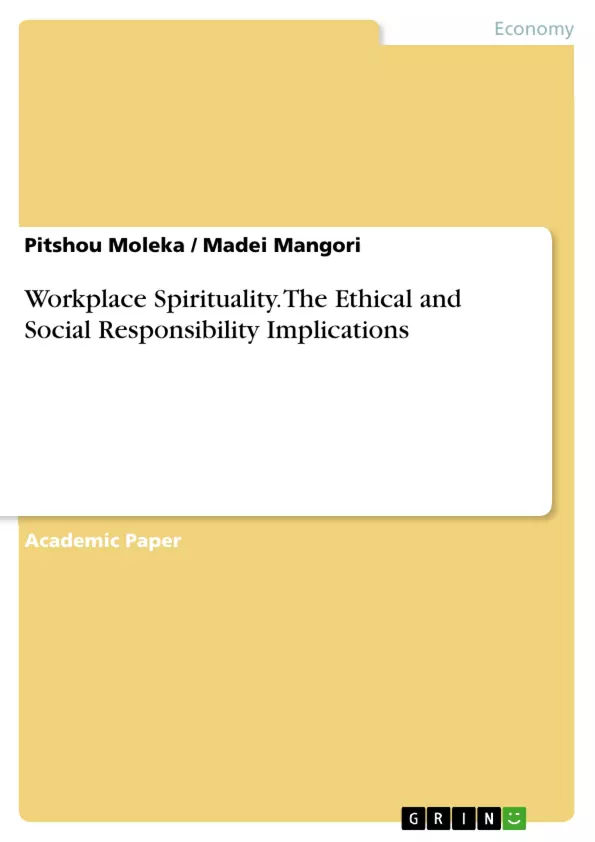Spirituality manifests itself in three main ways. Employees who practice individual spirituality may believe that their company is trustworthy and that they are connected to one another on the job. Workplace spirituality at the organizational level inspires everyone in the organization to strive for excellence as well as individuality. They address both the societal level, which is related to social issues and poor environmental conditions brought on by rapid industrial growth, and the individual level by providing an environment where people get along, enjoy what they do, and have personal goals and beliefs that are in line with the organization's mission. The ethical and social responsibility aspects of workplace spirituality will be discussed in this book.
The concept of workplace spirituality refers to the idea that employees can bring their spiritual or religious values and beliefs into the workplace. This can have several ethical and social responsibility implications for organizations, including respect for diversity: Encouraging workplace spirituality can help organizations to respect the diverse beliefs and values of their employees. However, organizations need to ensure that they do not discriminate against employees who do not share the same spiritual or religious beliefs.
Workplace spirituality can encourage employees to be more socially responsible and to make decisions that benefit society as a whole. However, organizations need to ensure that they do not use spirituality as a way to avoid their responsibilities to society or to promote their own interests at the expense of others. To guide the practice of CSR some principles are necessary: Stakeholder principe: businesses have a responsibility not only to their shareholders, but also to a wider range of stakeholders, including employees, customers, suppliers, and the local community. All businesses should prioritize the interests of all stakeholders and not just the financial interests of shareholders. Triple bottom line principle: businesses should focus on not just financial performance, but also social and environmental performance. The triple bottom line framework includes measuring a company's success based on its economic, social, and environmental impact.
Inhaltsverzeichnis (Table of Contents)
- Introduction
- An overview of the literature
- Organizational culture
Zielsetzung und Themenschwerpunkte (Objectives and Key Themes)
This book examines the ethical and social responsibility implications of workplace spirituality, exploring how integrating spiritual practices into the workplace can affect organizational culture, employee wellbeing, and social responsibility.
- The ethical implications of workplace spirituality
- The social responsibility implications of workplace spirituality
- The relationship between workplace spirituality and organizational culture
- The role of workplace spirituality in promoting employee wellbeing
- The impact of workplace spirituality on ethical decision-making
Zusammenfassung der Kapitel (Chapter Summaries)
Introduction: This chapter introduces the concept of workplace spirituality and its potential ethical and social responsibility implications for organizations. It highlights the importance of respecting diversity, promoting social responsibility, and ensuring that spirituality is not used to avoid corporate responsibilities or promote self-interest.
An overview of the literature: This chapter reviews the existing literature on workplace spirituality, discussing its potential benefits and challenges. It examines the findings of various studies that explore the impact of workplace spirituality on employee well-being, ethical behavior, and organizational culture.
Organizational culture: This chapter delves into the concept of organizational culture, drawing upon the work of Trompenaars and Hofstede. It explores the evolution of the concept of organizational culture, highlighting the significance of Hofstede's six-dimensional model for understanding national cultures and their influence on organizational structures and dynamics.
Schlüsselwörter (Keywords)
This book focuses on key concepts such as workplace spirituality, ethical implications, social responsibility, organizational culture, employee wellbeing, stakeholder principle, triple bottom line, diversity, and cultural dimensions.
Frequently Asked Questions
What is the concept of workplace spirituality?
Workplace spirituality refers to the idea that employees can bring their spiritual or religious values and beliefs into their professional environment, fostering a sense of connection, trust, and purpose.
How does workplace spirituality affect social responsibility?
It can encourage employees to be more socially responsible and make decisions that benefit society. It often aligns with Corporate Social Responsibility (CSR) principles.
What is the "Stakeholder Principle" mentioned in the book?
The stakeholder principle suggests that businesses are responsible not only to their shareholders but also to employees, customers, suppliers, and the local community.
What does the "Triple Bottom Line" framework include?
The triple bottom line measures a company's success based on three impacts: economic (profit), social (people), and environmental (planet).
How can organizations avoid discrimination while promoting spirituality?
Organizations must ensure they respect diversity and do not discriminate against employees who do not share specific spiritual or religious beliefs, maintaining a neutral and inclusive environment.
- Citation du texte
- Dr. Pitshou Moleka (Auteur), Madei Mangori (Auteur), 2023, Workplace Spirituality. The Ethical and Social Responsibility Implications, Munich, GRIN Verlag, https://www.grin.com/document/1362881



